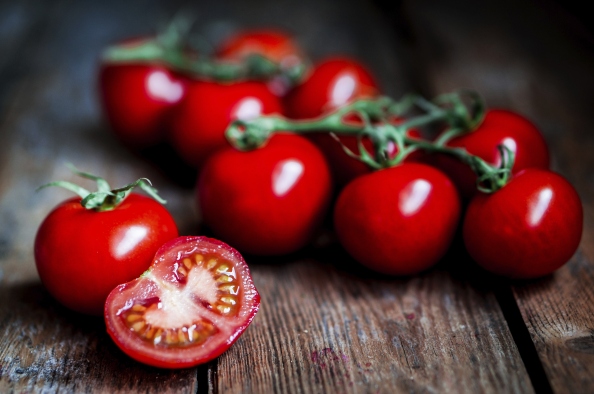
We all too often simply put all food items into the refrigerator because we tend to believe that all foods need to be kept chilled in order to stay fresh and not spoil. While many prepared items should be refrigerated, there are certain items, produce and products that should not be refrigerated. In this article we will let you know what items should be refrigerated and which ones should be kept at room temperature.
Items That Should Not Be Refrigerated

Tomatoes
Sure, if you slice a tomato and only use half of it, you should put the other half in the refrigerator to extend its life an extra day or so. However, for whole fresh tomatoes, the refrigerator is a death sentence. When in the refrigerator, tomatoes tend to get soft in certain spots, and the meat inside begins to break itself down. Also, you will notice a duller flavor from refrigerated tomatoes, so store tomatoes outside of a bag at room temperature in a bowl or in a pantry.

Onions
Onions are not favorable of the refrigerator. Not only does the cold dull the bite the have, but onions will not last as long in the refrigerator as they will stored at room temperature. Store onions in a mesh bag or a container that allows them to “breathe.” Another point that is important to note: do not store onions near potatoes. Potatoes emit gasses from them that when absorbed by onions, causes them to begin to rot. If you find soft mushy spots forming quickly in your onions, you can bet that the potatoes are to blame.

Coffee Grounds
Coffee Beans and coffee grounds are very temperamental when it comes to keeping their flavor “in-tune.” The biggest factor in the change in flavor when refrigerated is the moisture that is in refrigerators and freezers. This moisture attacks the beans and grounds, and leaves the flavor altered in different ways — depending on the original flavor.

Any Type of Squash
Squash in its various forms (butternut, spaghetti, acorn, etc.) are naturally very durable with their skin. While refrigerating most varieties will not adversely affect or change the flavor of the squash, it is unnecessary.

Bread Items
The reasons you don’t want to refrigerate bread items such as loaf breads, bagels or tortillas is two-fold. First, the refrigerator will dry out the breads at an exponential rate. Second, there is still moisture circling in the refrigerator, which can lead to mold on the breads at a faster rate. Instead, store bread items at room temperature in a sealed bag.
Items That Should Be Refrigerated

Dairy Items
This is almost a no-brainer, but should be included as a reminder. One of the most misunderstood dairy items is butter; many believe it is safe to keep butter at room temperature, while many others disagree. Well, both parties are correct to a certain degree. Butter can be left in a covered butter dish at room temperature for 5-7 days, after-which it starts to go bad. You usually will not see the type of spoilage that occurs with milk or yogurt, because butter is mostly fat. However, bacteria will start to form after about a week at room temperature, and some of those bacteria cultures may make you sick.

Assorted Nuts
This one might be surprising to some, as nuts such as almonds, peanuts, walnuts and other varieties seem like they would be a “dry good” that doesn’t need to be refrigerated. However, you must remember that nuts are a form of produce just like carrots, lettuce and other fruits and vegetables. Make sure to keep them refrigerated to avoid spoilage and bacterial growth.

Maple Syrup
Probably the biggest reason why we forget to refrigerate maple syrup is that we constantly see bottles of maple syrup on the breakfast table, or near the condiments of our favorite breakfast diners. Maple syrup, however, can spoil if not refrigerated. Many will be surprised to know that maple syrup has an incredible short shelf life — as little as a month for real syrup without any preservative. When refrigerated, maple syrup’s shelf life can be extended for up to a year. Maple syrup is prone to developing mold, especially in the nozzles of bottles, so check you maple syrup often.

Dried Fruit
Another item that may take many by surprise, dried fruit seems like it would be fine sitting in the pantry at room temperature, but the truth is that people began drying fruit as a way to extend the shelf life of fruits. It is only an extension, and does not make the fruit non-perishable, but extends the shelf life to about 6 months — if refrigerated.
We have barely scratched the surface of what items should and shouldn’t be refrigerated, but these few examples should serve as a reminder that refrigeration is not a miracle worker that makes food items non-perishable. Refrigeration simply extends the shelf life of some items, and other items it can decrease the shelf life.
































